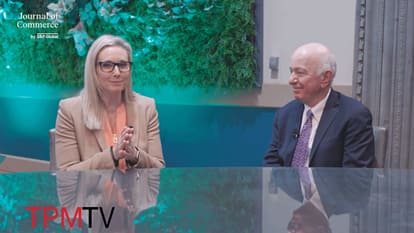- Program
- What's New
- Speakers
- Who's Attending
- TPM Community
- Partners

TPM Partnership
Partnership places your company in a position of authority and enables you to build and strengthen your relationships, visibility and reputation with major shippers
LEARN MORE - Media

TPM TV
Episodes of exclusive TPM content featuring interviews of key stakeholders and attendees.
WATCH NOW - About

About TPM
The must-attend conference for the trans-Pacific and global container shipping and logistics community
LEARN ABOUT TPM - Get Updates
- FAQ's
Sessions With Casper Ellerbaek
Monday, 4 March
-
10:30am - 11:30am (PST) / 04/mar/2024 06:30 pm - 04/mar/2024 07:30 pm
Container Shipping Outlook: Beyond the Down Cycle
In the wake of the massive rate hikes and record profitability for ocean carriers in 2021-2022, the container shipping industry has returned to pre-pandemic/historical profitability levels. And yet services are far from normal: The capacity-sucking routing of capacity away from the Suez Canal because of fears of Houthi rebel attacks in the Red Sea, coupled with Panama Canal’s drought restrictions, is jolting container spot rates from Asia to North America and Europe. The surge, however, may be short-lived given the modest expectations for import growth in North America during a time when there’s plenty of ship capacity to spare. Facing an inflationary environment restraining demand growth, carriers ultimately will have to reduce capacity, barring another shock to capacity due to disruption. For now, that’s come through more aggressive blanking of sailings, much to the chagrin of shippers and forwarders. At the same time, maritime regulators are becoming more aggressive, with the Federal Maritime Commission's new mandate from Congress and the sunsetting of Europe’s block exemption. That’s forcing carriers to reconsider the risk exposure of vessel-sharing agreements and their networks. Europe’s new emission trading system is giving carriers a taste of the higher costs tied to decarbonization that they’ll need to pass through to customers. More generally, shippers remain reluctant to embrace more expensive green shipping services, even as carriers invest billions of dollars for ships that will be able to run on cleaner fuels. While it may be a familiar down cycle of overcapacity, new geopolitical and regulatory challenges, coupled with a dimming global economic outlook, promise something entirely new. This session, an annual TPM focal point, will take stock of the trans-Pacific trade and cast an eye to what is shaping up to be an uncertain and angst-filled 2024. In the process, it will answer the following questions:
• How big a drag is the down cycle on carrier profitability?
• What is the supply-demand outlook for 2024 and 2025?
• How are major external and internal forces reshaping networks?
• How are carriers managing decarbonization investment risks?

